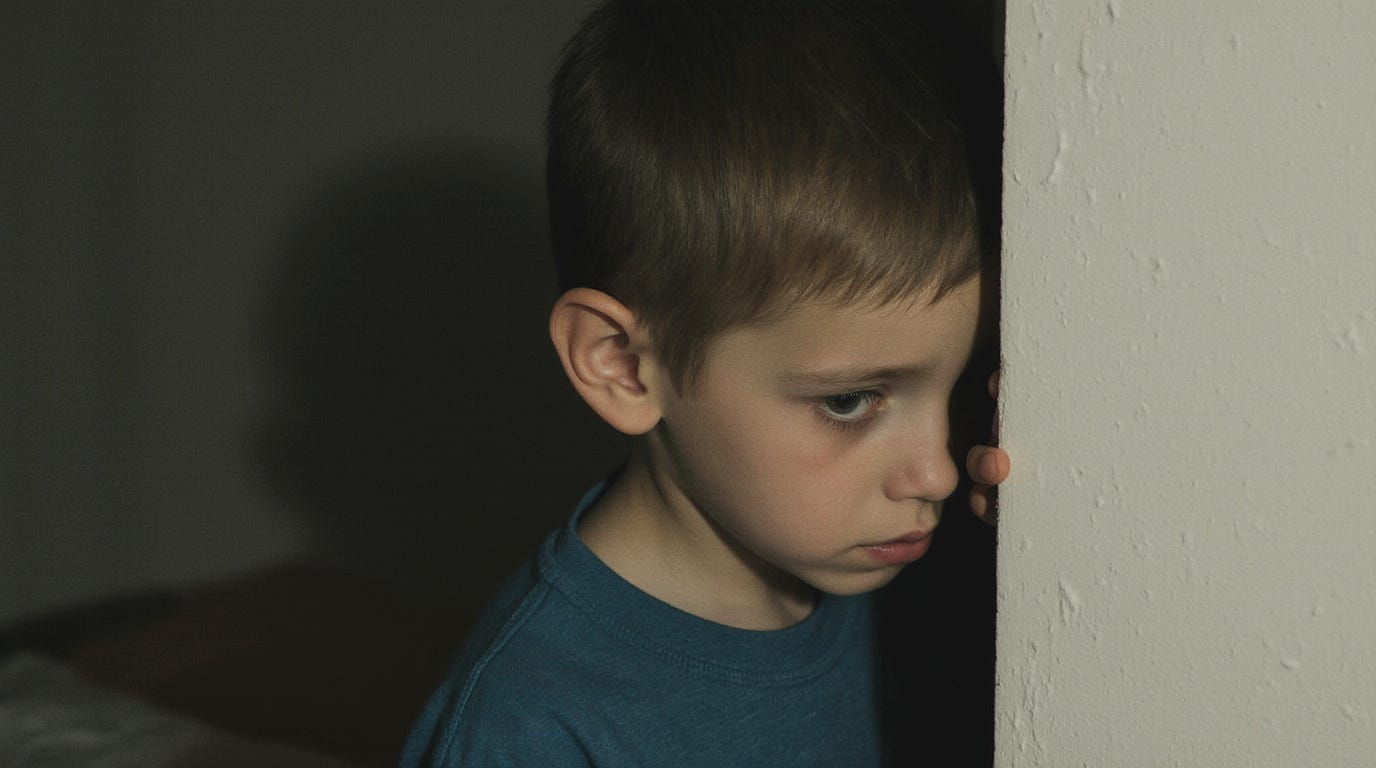When Success Is Failure and Failure Is Success
Wear a golden mask long enough and you lose sight of what you look like beneath it
He was the starchild, the firstborn, the solace of a frustrated father and a miserable mother who hated being together. The parents? They had married out of perceived necessity, of shaming and social pressure, enough to compel them both to reluctantly settle with each other — a severe compromise, a watering of wine to the point of absolute disgust for one another, and for themselves for their inescapable compulsion to bargain down so much with each other.
It’s hell growing up in a household where parents hate being with each other slightly more than they hate themselves.
A marriage of regret
Unhappy parents with unresolved trauma inevitably vent their regrets and frustrations onto their children. Children are easy targets to release your negativity on, and they are also the product of the parents’ union — the result and reminder of this unfortunate occurrence.
Happy parents love their children. Conversely, unhappy parents resent them; they see them as an undesired obligation, a toxic byproduct of misfortune, something done to the parents. They see their children as a remorseful contract they made by mistake, a mandate that keeps them in a marriage they deeply regretted. Children are seen and treated as the chains of this bondage, blamed by the parents for the errors of the parents, resented for existing, as they embody the parents’ pain and frustration. Unhappy parents — who don’t own up to their responsibilities towards innocent children they decided to bring into their unhappy household — pass their burdens onto those children. They lack the moral accountability to accept that their unhappiness they brought on themselves from settling with each other out of desperate need, rather than dignified want. And the firstborn takes the burden from the start, all alone, all at once. Who else would serve as a more exclusive, convenient, and therapeutic punching bag?
The starchild
From his first moments of awareness, he was exposed to the terror of a home full of threats, intimidation, and horror. Nothing felt safe in an age and in a place where everything should, if a human is to grow healthy in body and mind.
He used to wake up startled at night, jumping from the shouting, the screaming, the beatings. The father was terrorising the household with his manic eruptions of screaming and squealing, and the mother loved to play the victim and make him feel responsible for her misery. He was the firstborn, after all — the “responsible” one, burdened with keeping everyone satisfied (a doormat, a tool, a people-pleaser).
From a very young age, as he fell down the dark well of dissociation from such a nightmarish, inescapable reality and from his true self, he routinely stood against a wall, all alone in the darkness of his bedroom, rhythmically knocking his forehead on the cold concrete. The physical pain was a way to distract him from the horror or feeling unsafe in the one place that should feel the safest: home. He’d confessed to this in his mid-40s.
So, the starchild had internalised the abuse from his parents, the sense of unending unsafety, of constant vigilance to the next unwarned eruption of screaming from monstrous parents with little compassion for themselves, let alone for their children.
Parents unhappy with each other turn to their children as a coping mechanism. They exploit their children for their utility: an extension of themselves, a project of parental self-aggrandising, a self-gratifying distraction from their miserable lives together.
The firstborn is usually the first target of their projections. And since their children will certainly be dissociated due to an abusive household, the children (especially the firstborn) likely adopt the false self of the “starchild”, the fake persona of the overachiever that “makes his parents proud”, who doesn’t matter to anyone unless he gets the best grades, displays the most agreeable, submissive behaviour, obeys authority without question, never talks back, never has a will of his own. His is the persona of the Boy Scout, the one who tells on the smaller kids, the snitch, the rat, the alpha slave Uncle Tom. The starchild hates his smaller siblings for their “stepping out of line”, as his internalised, desperate need to please the parents becomes organic to him — he’s become a willing slave, deriving satisfaction out of pleasing his abusers.
This, the overachiever firstborn, the starchild, is driven only by his parents’ deliberately withheld approval (approval that ironically does not matter, since it is manipulative, and it comes from desperately broken and unkind people). Even if you do get their approval, you will realise it’s meaningless and unimportant, and that you have wasted your whole life trying to get it.
So he keeps on living his life like he’s expected to live it: to make daddy and mommy proud, especially daddy with his perpetually unsatisfied, deliberately “disappointed”, manipulative demeanour. This child’s entire being is all about people-pleasing, starting from the most immediate of people: the parents. All the parents want is a little star child as an excuse to brag to their peers, to fill the gaps of their inefficiencies, to be yet another layer of beautiful lies for the fake outer image of their horrible marriage.
Top grades don’t prove intelligence, nor hard work: they prove agreeableness and unquestionable obedience to authority figures, starting from parents, the schooling system, and then the state. The state rewards obedience with cushy, comfortable, convenient, and totally useless jobs at the expense of actual workers who produce real value in the economy.
And this was his success: a soulless, useless, parasitical job in the government, whose rewards gave rise to his impostor syndrome. Somehow, the inner child knows that top marks aren’t serving anyone, and that getting paid handsomely for a non-job on the backs of others isn’t giving meaningful value to society, and it certainly does not earn anyone’s respect — anyone’s that matters, at least. Yes, sleazy people respect money and perceived status, but they don’t matter. The subconscious knows, hence, impostor syndrome, the feeling that he is a fraud (which he is).
But his false self is willfully blind to the fact that he is a fraud. How can he admit to himself that his success means nothing? He invested his entire life into this persona,
Unsuccess
Stachildren tend to succeed in life, in the most vapid, superficial definition of the term “success”: money, perceived status, acquaintances they call ‘friends’, privileged jobs that come with ethical strings attached, and popularity with impressionable people whose approval doesn’t matter to anyone that matters, and the cherry on top: not recognising who they see in the mirror.
His early, luck-reliant success built his conceit. His fragile, superficial, and badly acted arrogance was his problem, his barrier to humility. His “success” was his failure to see the need for self-improvement. By “succeeding” by mainstream standards, he erroneously assumed “he had arrived”, that he had nothing in need of fixing. He was treated by the hypocrites around him as if he were perfect, as though he were whole — but he wasn’t, not by a longshot.
In his delusion of unmatched accomplishments and of peak self-actualisation, he kept riding the momentum of appeasing his manipulators, the father-authority figures around him who deliberately withheld their approval — those who scarcely gave glimpses of badly acted approval, but only when he submitted to their expectations, just to ingrain his conditioning. He kept satisfying his abusers, his shamers, so he kept on being rewarded for succumbing to shame — he’d made himself a tool.
This shame-conditioning, though, was his shadow, forever following him, even to his ivory towers of “success”. So, he kept wondering why he felt so miserable, why he didn’t know who he was, even though he’d accomplished so much material accomplishment. He deep down felt like a fraud, an impostor, unworthy of his material and social gains.
He thus hated those who appeared to have more self-respect than he did, even though they had much less than he did. He couldn’t understand why those with less could have more. He despised them because they reminded him of how much he hated himself, despite his apparent “success”.
But you see, his problem, his failure, was his “success”. He kept “following society’s programming”, which he admitted himself, word for word. He didn’t really accomplish anything meaningful — he was just rewarded for being an obedient pleb, a good slave, an Uncle Tom, with some extra privileges at the cost of his soul — the alpha slave who hates the other slaves more than he hates his master, since slaves remind him of how pathetic and sold-out he’s become, without a soul or identity or dignity. He’s succeeded in being a nobody.
The pitfalls of “success”
His success was his failure because he never had to reach rock bottom to realise that he never needed social approval to be OK with who he was. He never had to be ostracised, to feel like a complete failure, to realise he never needed anyone’s approval in the first place, to detach his self-esteem from rigged social approval.
His “success” was nothing but Pavlovian conditioning using “social approval” and perceived “status” to tame obedient dogs while they imagine they somehow have “free will”.
His self-esteem became more and more reliant upon opinions by people who don’t matter to anyone who matters. So, his opinion of himself mattered less and less. With such frustration from cognitive dissonance — being “successful” but also not knowing the source of shame, unhappiness, and low self-esteem — it is only natural for him to go insane, erupting from nothing, misinterpreting words and intentions through the lens of his inner paranoid voices, those that confirm to him that he has always been a weak loser granted some social status as a conditioning reward, just like we throw a dog a treat to associate pampering with commands to “get down and roll over”. Good doggie!
Key takeaway
Don’t let your perceived “success” blind you to your need for self-improvement. If you think you’ve got it all figured out just because you have “proof” of efficacy, you’re missing out on useful insight. If you lose your humility due to your “status” in the eyes of impressionable ass-kissers, you will reject self-accountability and self-growth, which will ironically bring you opportunities to be humiliated.
But the worst part of resting on your laurels, of leaning back in complacency as if you “made it”, is that you become blind to your trauma and the gaps in yourself, especially your dissociated true self buried under mountains of social proof accomplished by the false self. As you drift further and further away from your true self, you begin to experience impostor syndrome, feeling like a fraud for enjoying successes that aren’t yours — not ‘yours’. You’ll subconsciously be aware of your inadequacies, as well as your self-esteem’s hopeless reliance upon external validation, and you will have no choice but to resent yourself for being so weak.
In truth, “failure” by mainstream definitions can indeed be epic success if it teaches you to be self-reliant, to be free from the desperate need of external, meaningless validation. If you can be a “loser” and still have dignified, internally sourced self-esteem (if anything, from being true to principle), then what’s the use of riches on which your self-regard desperately relies?
What is “success” other than a failure to be yourself in this short life, the only opportunity to be you?






This article is part sermon, part psychological profile, wholly interesting.